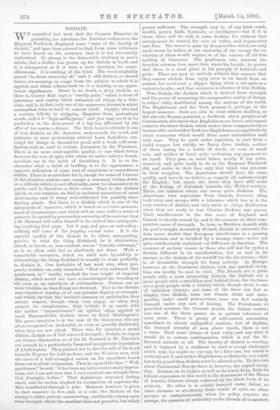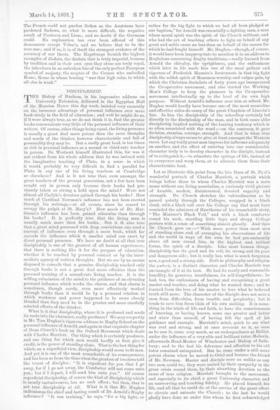DISDAIN.
"WE remarked last week that the German Emperor, in punishing the Alsatians for Parisian rudeness to the Empress Frederick, displayed some "want of the faculty of disdain," and have been amused to find, from some criticisms we have heard on the sentence, that it is not universally understood. So strong is the democratic tendency in men's minds, that a dislike has grown up for disdain in itself, and it is interpreted as if it were a mere synonym for super- ciliousness. It is nothing of the kind. The word originally meant " to deem unworthy of," and it still derives, or should derive, its meaning in usage from the subject to which it is applied, and which reflects back on it a healthy or an oppro- brious significance. There is, no doubt, a dirty disdain, as there is, Currer Bell says, a "mucky pride," which is born of ignorance and vanity, which estimates all things by a false scale, and is, in fact, only one of the numerous dresses in which assumption tries so hard to conceal itself. Carlyle, who bad a curious felicity in stripping disguises from pretentious words, called it " high-sniffingness," and you may see it in its perfection in the demeanour of a lap-dog affronted by the offer of too coarse a dinner. The little beast's attitude is one of true disdain, as the democrat understands the word, and indicates at once pretensions without basis, fastidious con- tempt for things in themselves good, and a weak self-satis- faction such as used to irritate Jerusalem in. the Pharisees. There is no more contemptible quality, or one which better deserves the sort of spite with which we notice inferior female novelists are in the habit of describing it. It is to the character what a habit of bridling is to the appearance, a concrete indication of some sort of emptiness or unreadiness within. There is no antidote for it, except the sense of humour in the observer, and no cure except a summary taking down, or a ridicule which, to act effectually, must be administered in public, and is therefore a little cruel. That is the disdain which, to our surprise, we find in exclusive possession of most dictionaries, and of many well-cultivated but possibly unre- fleeting minds. But there is a disdain which is one of the safeguards of character, which is based on accurate measure- ment of circumstance, and which will no more suffer a waste of power to be caused by provocation unworthy of its exercise, than a St. Bernard will suffer himself to be excited into extinguish- ing anything that yaps. Let it yap, and pass on unheeding ; nothing will come of the yapping except noise. It is the especial quality of this disdain to be silent, unregarding, passive, to treat the thing disdained, be it obstruction, attack, or insult, as non-existent, not as " beneath contempt," as is so often said, but as absolutely not there. With a remarkable exception, which we shall note by-and-by, to acknowledge the thing disdained is usually to cease perfectly to disdain it. Our Archduke of last week who, when pur- posely trodden on, only remarked, "How very awkward that gentleman is! " hardly reached the true height of imperial disdain, which would not have acknowledged the treading at all, even as an exhibition of • awkwardness. Princes are no more trodden on than Kings are drowned. This is the disdain men expect of royalty, or of any genuine dignity or strength, and which, by that fine instinct common to multitudes, they always respect, though when very angry, or when they suspect its completeness, they belittle it in words with the epithet " impassiveness," an epithet often applied to Lord Beaconsfield's disdain, never to Lord Hartington's. The great exception is in the case of the humorous, who are often recognised as disdainful, or even as grandly disdainful, when they are not silent. There was, for instance, a grand disdain, disdain as of full reserved strength ; disdain, to repeat our former illustration, as of the St. Bernard, in Mr. Lincoln's one remark to a particularly fussy and inopportune deputation of Abolitionists. They pointed out to him the will of the Lord towards Negroes for half-an-hour, and the Western man, with the cares of a half-strangled nation on his shoulders, heard them out in silent resignation. Then he opened his lips : " Well, gentlemen," he said, " it has been my lot to receive many deputa- tions, but I am not sure that I ever received one straight from God Almighty before." That deputation retreated feeling small, and the nation laughed its recognition of supreme dis- dain manifested through a joke. Humour, however, is given in that measure to few, and, as a rule, the disdain of the strong is silent, patient, unanswering, confidently relying upon some strength which the assailant does not perceive, but which proves sufficient. The strength may be of any kind—rank, wealth, power, faith, fortitude, or intelligence—but if it is there, there will be with it some disdain, for without that energy must be wasted for ever on trifles, and degenerates into fuss. The nerve to pass by disagreeables which are only made worse by notice, or are unworthy of the energy the ex- tinction of them would require, is of the essence of all true nobility of character. The gentleman who answers the drunken cabman does more than waste his breath ; he proves that there is a weak place in his panoply of fortitude and pride. There are men so entirely without that armour, that they cannot abstain from reply even to an insult from an animal, but must send a slipper flying when a eat spits or a cockatoo laughs ; and that weakness is absence of true disdain.
True disdain, the disdain which is derived from strength and the power of measuring the comparative reality of things, is rather oddly distributed among the nations of the world. The Englishman and the Turk possess it, perhaps, in the largest measure. Both are able to exist without duelling, as did also the Roman patriciat, a fortitude which perplexes all Continentals who know that Englishmen are brave, and cannot conceive the inner disdain which makes them comparatively so immoveable; and neither Turk nor English man care particularly about comments which would drive some nationalities mad with rage. They lie quiet under aspersion, in part from a stolid temper, but chiefly, we fancy, from disdain, neither of them caring for a battle of words, or even of small acts, and neither at heart quite reckoning any opponent as an equal. They pass on amid hisses, nearly, if not quite, unmoved, and quite ready to do as the Empresi Frederick did, and notice to their foes only that which was gracious in their reception. The Americans should have the same quality, and have it, we believe, as regards all nations except the English ; but about the latter they have still some of the feeling of Colonials towards the Mother-country. There are relatives whom one never quite disdains. The Americans bear aspersions from Canada, however, often both witty and savage, with a tolerance which has in it the very essence of disdain, and only smile at Judge Haliburton when they are ready to tear Charles Dickens into pieces. Their sensitiveness in the two cases of England and Canada is clearly caused by, and is the measure of, their com- parative sense of strength. In Asia, as Matthew Arnold, with the poet's insight, accurately divined, disdain is universal, for Asia never doubts that European interference is a passing phenomenon, and is fortified by a strange sense—never yet quite satisfactorily explained—of difference in duration. The creature of an hour rouses in those who will last for cycles a disdain different in its manifestation, but as real in its essence, as the disdain of the mastiff for the fox-terrier,—that is, of irresistible strength for fussy activity. In Europe, however, on the Continent, disdain, with one marked excep- tion, can hardly be said to exist. The French are a great people with a most interesting history, the Italians are a great people with a matchless past behind them, the Germans are a great people with a history which, though short, is one of unbroken victory ; yet none of the three can feel or display true disdain, none can remain silent and mare- garding under small provocations, none can feel serenely tranquil under any sort of hissing. The Frenchman so provoked screams, the German growls, the Italian curses ; not one of the three passes on in patient tolerance of mere noise. There is plenty of self-control, amounting sometimes to almost undignified caution ; but of disdain, the tranquil serenity of men above insult, there is not a trace. Each must always at least reply, and say what it would do in certain contingencies, which is not the St. Bernard attitude at all. The faculty of disdain is wanting, and is replaced by a readiness to send or accept challenges which may, for aught we can say, be a finer one, but which is certainly not it, and strikes Englishmen as distinctly less royal, less truly grand than disdain must be allowed to be. To this rule about Continental Europe there is, however; one superb excep- tion. Disdain, in its higher as well as its lower form, finds its loftiest expression in this world in the demeanour of the House of Austria, hitherto always endorsed by the whole body of its subjects. No other is so calmly tranquil under defeat, no other abstains so absolutely from words of spite, no other accepts so instantaneously, when its policy requires the change, the enemies of yesterday as the friends of to-morrow.
The French could not pardon Sedan as the Austrians have pardoned Sadowa, or, what is more difficult, the negative result of Custozza and Lissa ; and we doubt if the Germans could. No explanation has ever been offered of this demeanour except Vehse's, and we believe that to be the true one ; and if so, it is of itself the strongest evidence of the accuracy of our thesis. The Hapsburgs furnish the highest examples of disdain, the disdain that is truly imperial, because by tradition and in their own eyes they alone are truly royal, the inheritors in an unbroken line of the only perfect European symbol of majesty, the sceptre of the Caisars who embodied Rome, Rome in whose bearing "was that high calm, to which all else is weak."



































 Previous page
Previous page